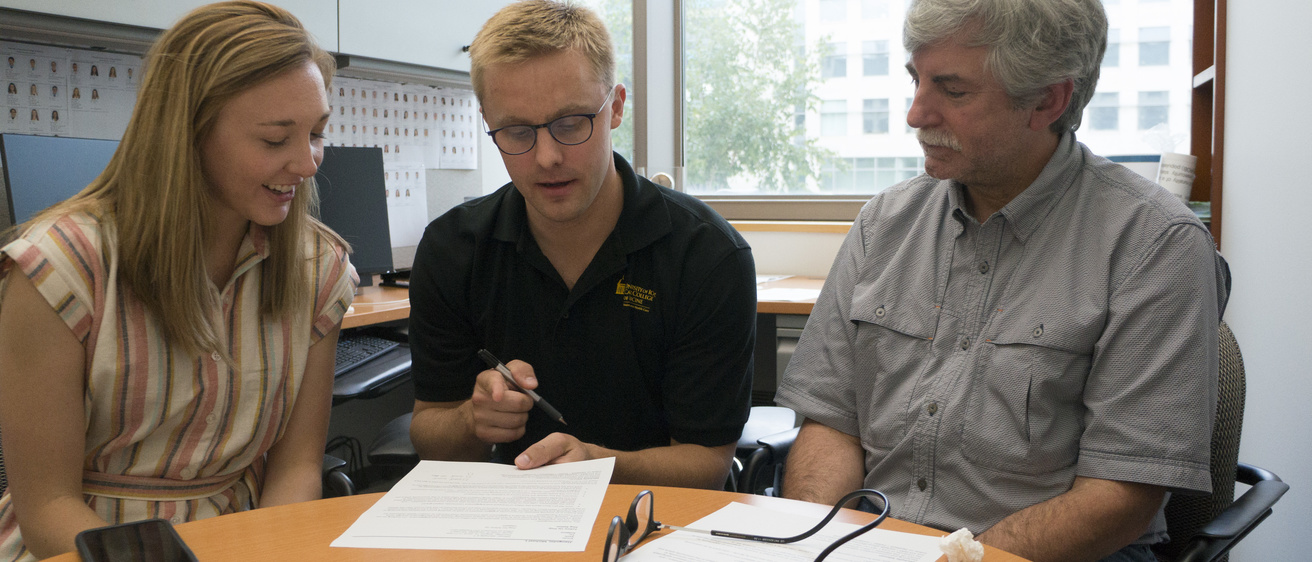A pregnant patient with diabetes who’d been labeled noncompliant led Craig H. Syrop, MD, MHCDS, Obstetrics and Gynecology, Carver College of Medicine, to ask a simple question. Why?
Looking beyond the clinic visit to find the root cause of a patient’s issue is a new approach for medical practitioners today. Traditional medical training teaches physicians to focus on the clinic visit, however Syrop’s personal experiences studying for the Master of Health Care Delivery Science pushed him to think beyond the patient-physician encounter.
A nurse explained the “noncompliant” diabetes patient was experiencing a disruptive social situation, housing issues, and food insecurity.
“There wasn’t any active desire on this woman’s part not to do well with managing her diabetes," Syrop said. "It was a social circumstance impeding her from doing it, which then led us to approach the food pantry to try and understand how we might help connect people with resources to combat some of the food insecurity aspects."
Unfortunately, making needed lifestyle changes are more difficult when confronting both food insecurity and the limited food choices at pantries.
The idea was born to offer treatment for food insecure patients dealing with chronic diseases, such as diabetes, hypertension, and obesity, at the Coralville Community Food Pantry.
At the same time, medical student Jared Peterson was challenged to engage the community and improve health outcomes for his community health outreach elective. He, too, reached out to the Coralville Community Food Pantry to start an “upstream” clinical project.
“It’s a great coincidence, because we wanted to do what Jared wanted to do, and we were in the process of working towards it,” said Syrop. “We didn’t know about Jared and he didn’t know about us.”
Others, however, knew about both. Penny Rembolt, previously serving a variety of roles with Carver College of Medicine and the Mobile and Upstream Clinics, and John Boller, executive director of the Coralville Community Food Pantry, brought the groups together.
Iowa students across disciplines—from medical to public health, pharmacy to nutrition, graduate studies and beyond—share a sense of social equity and justice, along with a desire to be engaged.
“Our role as faculty is to support those efforts and help provide leadership training, to do other things that will be important for them,” Syrop said.
Part of that support was to include research in the project.
Syrop pulled in his colleague, Michael L. Haugsdal, MD, Obstetrics and Gynecology, Carver College of Medicine and the Upstream Clinic group, which follows the fundamental belief that they need to work upstream from the clinical problem.
“Turning it into a research project is step two to help us improve our programs or our projects, but also to allow us to give some objective data back to the people who are giving us time, and support, and money, to show what the impact is, Haugsdal said. "It really stemmed from a need in the community to provide a service, but research then helps us to support it, continue, and refine it.”
Research focused on student engagement and the desire to address social inequity and the problems facing the patients they see.
"Realistically, a lot of work is done like that and there’s never any evidence of benefit or return on investment for those social activities and community engagement,” said Syrop. “You need to be able to prove that what you’re doing has an impact. Plus, it’s also good for the students to understand that you need to be able to measure the outcomes of the work you’re doing.”
In addition to Syrop and Haugsdal, the project involved graduate students in clinical nutrition, interdisciplinary health sciences students from the Upstream Clinic group, the Mobile Clinic, and Coralville Community Food pantry staff, volunteers, and clients.
“We’ve had to invent a lot of things, but we are constantly making connections with groups in the community, other healthcare providers who have the same interest, or students who have the same interests," Haugsdal said. "We are just basically not working in silos anymore and kind of bringing everybody together in that common effort."
The Coralville Community Food Pantry brought their expertise to the project as well, such as acquiring and distributing food. But they also began thinking differently about ways to serve their clients, including applying for a grant to fund fresh-food opportunities for their clients.
The project will assist food pantry clients with self-management of their chronic diseases through education and engagement, for example, labeling and scoring food appropriateness to medical condition. In addition, Iowa students will offer screenings, flu shots, and other services at the food pantry.
“It’s time we begin to demonstrate how to address the social, economic, and environmental determinants affecting health outcomes head on and develop future leaders for the business of changing medicine and changing lives,” said Haugsdal. “For students to get this exposure early on in their careers, every patient will benefit here forward.”
“They’ll see how they can be a force for change wherever they go,” added Syrop.
